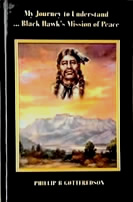Over the years, I have devoted my time to researching the history of the Utah Black Hawk War and the Timpanogos Nation and the agony they have suffered at the hands of Mormon settler colonialism. Many times, I sat in tears, overwhelmed by grief. And now, I must admit I spent little time wondering about those whose ancestors committed these human injustices against Utah's indigenous people. Over the past month, I have met some of those people, and what they say has opened my eyes to a new reality I wish to share. Because of their ancestors' past acts of violence, some live their entire lives in shame and have no voice to share their agony. Recently, decedents whose ancestors led in some of the massacres in the Utah Black Hawk War have contacted me, and I feel it necessary to share their perspectives of the Black Hawk War.
George E. Tinker wrote, "It is time we stop viewing these injustices as simply white processes and begin viewing them as human processes. It is time we apply the same yardstick to both groups--compassionately seeking to understand human actions in the past without flailing old wounds by "unabashedly" taking sides. Without confronting and owning our past, as white Americans, as Europeans, as American Indians, as African Americans, we cannot hope to overcome the past and generate a constructive, healing process, leading to a world of genuine, mutual respect among peoples, communities, and nations." But that "mutual respect" must begin by seeking to understand the history and human motivations of all these "peoples and communities, and nations" with a spirit of equity, balance, and compassion."
Healing does not come by simply acknowledging the wrongs of the past, but it's a beginning. So, what about those silent victims? As I have listened to what they say, there is no doubt they would like to express their regret to the Timpanogos Nation for the actions of their forefathers. They spoke about their families who have been outcasts and that they lie to their children about their relatives, sparing them from being shamed by society. But sadly, their children find out later on what their ancestors did, and the cycle begins again.
"Every day," one mother told me, "Not a day goes by that I ask what it was that made my great-grandfather do what he did?"
As a former member of the Church of Jesus Christ of Latter-Day Saints, I was taught never to question the authority of church leaders and to live my life according to the church's teachings or else be castigated from Mormon culture and society. Members of the church were governed by fear and shame and, in some cases, death. Not all followers agreed with this teaching; I left the church and turned to a life where critical thinking is accepted.
Who can teach us about human injustices better than those who are victims of injustice? Who is better qualified to build that bridge between our cultures than those who understand most how destructive racism and settler colonialism are to all? Learning from past mistakes and using that wisdom to help others will go a long way to bring about understanding and peace.
I genuinely believe that the silent victims need to have a voice to share their family's experiences without fear of censorship. They, too, need healing.
See: Truth In Education
